We have all heard that eggs are good for our health and that it has many health benefits. Yet, do we know exactly how it helps us and in what amounts?
This article aims to give you some clarity about the various benefits of eggs.
Benefits of Eggs – Nutritional Numbers And Related Terms
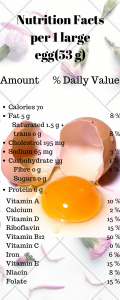
To begin with, let’s discuss the nutritional value of one egg.
By this time, it is common knowledge that eggs are a powerhouse of nutritional content.
Eggs are most famous for their high-quality proteins like riboflavin and selenium. Most of these are available in the egg white.
Besides, one large egg has about 13 essential vitamins and minerals. Most of these are available in the yolk. These include Vitamin-D, Choline, Lutein, Zeaxanthin, iron, minerals, carotenoids etc.
All this comes at the price of consuming around 70-78 calories. Now, if you are on a diet and restricting calories, you would know that it is quite the bargain.
Nutrition Facts – 27 Essential Nutrients and Benefits of Eggs
So, what are the essential nutrients in eggs and how do eggs keep us healthy through those components?
Most of you must be here because you want to find out how the consumption of eggs benefits your body. But since different cooking styles involve other materials that can cause add or subtract to the nutritional value of eggs, our discussion here will be contained to the nutritional benefits of a hard-boiled egg.
As per the nutritional value of eggs, they can provide you with around 27 vital nutrients.
Now, let’s dig into the meat of the issue and find out more about the nutritional facts1 (NIH) of one hard-boiled egg:
-
Calories
Calories are the fuel for the body. Calories are the fuel for the body. Along with providing energy to all the life-sustaining processes in the body, it also helps in performing any physical tasks.
You have a daily requirement of about 2000 calories. Out of this, one large hard-boiled egg provides about 70 calories. This is about 4 % of your daily requirement.
-
Protein
Protein is a bodybuilding component. It also helps to repair the tissue and muscle. Your body needs about 50 grams of protein per day.
One large hard-boiled egg has around 6.3 grams of protein. This is about 13% of your daily requirement.
-
Fat
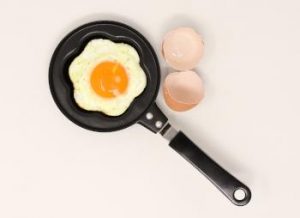
In contrast to the villainous role assigned to it, fats are essential for cell growth and to protect your organs.
In addition to that, it helps to keep you warm in cold conditions. This is because when the body is under cold conditions, fat is converted to energy for maintaining your body temperature. To top it all off, it also helps you absorb nutrients.
You actually may have heard this in some movies when the muscular guy complains to his companion who has more fat than him that because the former doesn’t have enough fat content in the body, he feels cold. Whereas his companion wouldn’t feel much cold as the fat in his body keeps him warm.
And to top it all off, it also helps you absorb nutrients.
Your body needs about 70 grams of fat per day. The fat content in a large, hard-boiled egg is about 4.55 grams. This is about 7% of your daily requirement.
-
Calcium
Calcium helps to build and maintain strong bones and teeth. While this is the main function of calcium, it is also partly responsible for the prevention of blood clotting.
Moreover, it helps maintain cardiovascular health and to prevent bone diseases like osteoporosis.
Your body needs about 1000 mg of calcium per day. One large egg has about 24 mg of calcium. This constitutes about 2% of your daily requirement.
-
Magnesium
Magnesium is important for bone formation. This is partly because it helps in absorption of calcium.
Apart from that, magnesium can also help to prevent migraine headaches and depression. Moreover, it also helps to lower blood pressure and boost exercise performance.
Your body requires about 380 mg of magnesium per day. One hard-boiled egg has around 4.45 mg of magnesium. This is about 1% of your daily requirement.
-
Iron
Iron is a vital component of your red blood cells. As such, it helps to generate and boost the haemoglobin, the oxygen carrier of your body, in your blood.
Likewise, it is used to treat anaemia and is a vital part of your circulatory system. Moreover, it is also an important part of your immune system.
The daily requirement for iron in your body is about 8 mg. The iron nutritional value of one large hard-boiled egg would be around 0.43 mg. That accounts to about 5% of your daily need.
-
Phosphorous

Primarily, phosphorus helps your body to repair cells and tissues. And like the others, phosphorous also has a wide array of health benefits.
It helps the kidneys to filter out waste, facilitate nerve conduction, assists in strengthening teeth and bone etc. In addition to these, it also helps build DNA and RNA, which are the genetic building blocks of the body.
The daily requirement for iron in your body is about 700 mg. With regards to phosphor content, the nutritional value of one large hard-boiled egg would be about 71.3 mg. That accounts to about 10% of your daily requirement.
-
Potassium
Potassium helps in preserving the mineral density of your bones and prevents the loss of muscle mass. Additionally, it helps in lowering blood pressure.
Your daily requirement of potassium is around 4044 mg. Out of this; about 2% (73 g) can be met by the nutritional content in one egg.
-
Sodium
First of all, sodium helps to regulate blood pressure. Any change in the amount of sodium in the body can lead to fluctuation in blood pressure.
Additionally, it helps in the absorption of nutrients and muscle contraction. It works in tandem with potassium for some of these functions. It also helps in the sending of nerve impulses and maintaining kidney health.
The daily need for sodium in your body is about 500 mg. The nutritional value of one large hard-boiled egg would be about 63 mg of sodium. That accounts to 13% of your daily need.
-
Zinc
The most important function of zinc would be the regulation of immunity in your body. Along with that, zinc also affects your cognitive ability and sexual growth.
Your body requires about 11 mg of zinc per day. One hard-boiled egg has around 0.41 mg of magnesium. This is about 4% of your daily need.
-
Selenium
Selenium is an anti-oxidant that lowers oxidative stress and reduces inflammation. As a result, it becomes important in the immune response of the body.
Moreover, it also prevents decline in cognitive ability and fertility.
The daily need for selenium in your body is about 55 mcg. The nutritional value of one large hard-boiled egg would be about 16.1 mcg of selenium. That accounts to about 29% of your daily need.
-
Pantothenic acid or Vitamin B5
Vitamin B5 helps the body in processing other nutrients and vitamins from your diet. It also helps in maintaining proper gut health.
Your body needs about 5 mg of Vitamin B5 per day. One large egg has about 1.14 mg of Vitamin B5. This forms about 23% of your daily need.
-
Vitamin B12
As another important component of your diet, Vitamin B12 is vital in red blood cell formation.
Also, it can help prevent a particular type of anaemia called megaloblastic anaemia. This is a condition that makes you weak and tired. Besides that, it also helps in making DNA – the genetic building block of our body.
The daily need for Vitamin B12 in your body is about 2.4 mcg. The nutritional value of one large hard-boiled egg would be about 0.361 mcg of Vitamin B12. That accounts to about 15% of your daily need.
-
Vitamin D
Notorious for its unavailability, Vitamin D is one of the most crucial elements for the body. It helps to absorb calcium and thereby, aids the health of bones and teeth.
It helps to improve cardiovascular health, lung function and cognitive ability. Moreover, it helps with diabetes management. Vitamin-D content is one of the key benefits of eggs.
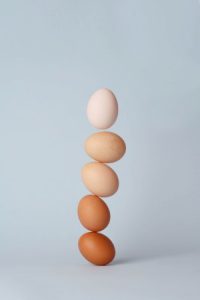
Eggs are one of the very few foods in nature that contain Vitamin D. Your body needs about 600 IU of Vitamin D per day. One large egg has about 18.3 IU of Vitamin D. This is about 3% of your daily need.
-
Copper
Copper works in conjunction with iron to form red blood cells. It also improves iron absorption, immune function and cardiovascular health.
Your body requires about 1.2 mg of copper per day. One hard-boiled egg has around 0.21 mg of copper. This is about 2% of your daily need.
-
Riboflavin or Vitamin B2
Vitamin B2 is vital to your health. This is because it helps to break down carbohydrates, proteins and fat to produce energy. It also helps the body in utilizing oxygen.
Your body has a daily need of 1.5 mg of Vitamin B2. The nutritional value of one egg is about 0.235 mg. This amounts to about 18% of your daily need.
-
Thiamine or Vitamin B1
Vitamin B1 helps and supports most of the core organs in the body like brain, nerves, heart and intestines.
Interestingly, it can also boost metabolism by helping the body to convert carbohydrates into energy. This goes in conjunction with people on diets for weight-loss or weight gain.
Out of the required daily 1.2 mg, one large egg can provide about 0.04 mg (i.e. about 3%) of Vitamin B1.
-
Folic Acid
Folic acid is important to the body because it helps in cell division and the production of healthy DNA. This prevents unhealthy DNA modifications that may result in diseases like cancer.
Your body needs about 400 mcg of folate per day. One large egg has about 26.1 mcg of folates. This makes up about 7% of your daily need.
-
Vitamin A
Vitamin A deficiency causes night-blindness. In fact, vitamin A can protect against age-related macular degeneration (eye diseases).
Besides that, it helps to boost immune function and reproductive capability. It also plays a role in the strengthening of bones and teeth.
The daily need for Vitamin A in your body is about 900 mcg. The vitamin A content of one large hard-boiled egg would be about 75 mcg. This amounts to about 8% of your daily need.
-
Vitamin B6
Vitamin B6 may protect against cognitive decline, anaemia and depression. Moreover, it can also help to maintain your cardiovascular health.
The body requires about 1.3 mg of Vitamin B6 per day. One hard-boiled egg has around 0.061 mg of magnesium. This is about 5% of your daily need.
-
Vitamin E
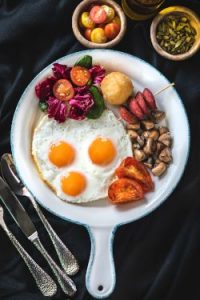
Vitamin E is an antioxidant that reduces inflammation. Thereby, it supports your immune system.
Your body requires about 15 mg of Vitamin E per day. One hard-boiled egg has around 0.684 mg of Vitamin E. This is about 5% of your daily need.
-
Vitamin K
A fat-soluble vitamin, vitamin K is important for normal blood clotting. It also helps to promote bone health and heal wounds.
The daily need for Vitamin K in your body is about 120 mcg. The nutritional value of one large hard-boiled egg would be about 4 mcg. That accounts to about 3% of your daily need.
Other minerals in eggs that are important but present in smaller quantities include Manganese, Niacin (Vitamin B3), Biotin Vitamin (B7), Omega-3 and Choline.
What do you say, folks? Not too shabby for a quick bite, huh? 🙂
Health Benefits of Eggs
Let’s discuss some of the health benefits of eggs to understand the ways in which an egg helps your body:
1. EGGS HELP IN StrengthenING Teeth and Bones
Eggs are one of the few natural sources of Vitamin-D. And vitamin-D is essential for building strong bones and teeth.
Besides that, Vitamin D also helps to improve your immune response and fight infections.
It also helps to lose weight, prevent cognitive decline and reduces the risk of Type 2 Diabetes.
2. EGGS HELP TO FortifY Immune System
Cells of the immune system are capable of synthesizing and responding to Vitamin-D. Vitamin-D also plays an important part in the innate antimicrobial response.
Moreover, studies2 (Aranow, 2011) show that Vitamin-D deficiency is prevalent in people with autoimmune diseases. The Vitamin-A content in eggs helps with this.
3. BENEFITS OF EGGS IN StrengthenING Muscles

Eggs contain Leucine, a high-quality protein. Leucine helps with early recovery of muscles in the body after a workout.
It also helps in building more muscle and strengthening your existing ones3 (Sobaler, 2017).
This makes egg an excellent choice for active people, athletes and body-builders.
4. BENEFITS OF EGGS IN Weight-Loss

No list about the health benefits of eating eggs is complete without mentioning weight loss. The protein in eggs gives you a feeling of satiety and fullness. This, in turn, helps you consume less food throughout the day.
Studies4 (Rebello, 2014) have demonstrated that satiating foods like eggs are effective in dietary strategies. This is especially applicable for weight loss.
5. Healthy Skin, Hair and Nails
Eggs contain Vitamin-A.
This helps in maintaining healthy skin and promotes the growth of healthy hair and nails5 (Egg Farmers of Alberta).
6. EGGS Help You Overcome Depression

Again, the Vitamin-D factor in eggs comes into play.
Studies6 (Greenblatt, Psychology Today) have demonstrated that Vitamin-D plays a role in improving your mood and psychological well-being.
7. EGGS Help in Smooth Functioning of Cells
Vitamin B types, like Choline in eggs, is an essential to many chemical reactions in the body. It helps to metabolize fats and helps other physiological functions.
In addition to that, it also helps in the proper functioning of the nervous system.
8. EGGS Protect Against Heart Diseases
Vitamin B12, as available in eggs, can help in preventing heart diseases. As a result, it helps in improving cardiovascular health.
Based on studies7 (NIH), scientists think that this is because they reduce the levels of homocysteine. This is an amino acid associated with an increased risk of heart disease.
9. Reduces Respiratory Infections In Children
Respiratory infections are one of the most common health issues in the world today.
An interventional study8 (Cannell et al., 2006) showed that vitamin D, as found in eggs, reduces the incidence of respiratory infections in children.
Moreover, according to WebMD, Choline, as found in eggs, may be used to treat asthma.
10. EGGS Help WITH Oxygen Circulation
Iron content in eggs helps with the oxygen circulation in the body. This is because iron is responsible for generating haemoglobin.
During iron deficiency, the haemoglobin level in the body will be low. This leads to low oxygen levels in the body. Thereby, your muscles will not get enough oxygen for functioning.
11. EGGS Reduce Risk of Eye-Related Diseases
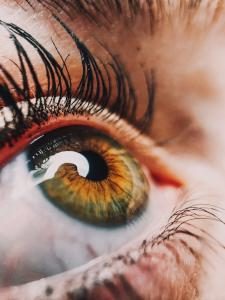
The Vitamin-A, Lutein and Zeaxanthin content in eggs may help prevent cataracts. They may also be effective in preventing age-related macular degeneration (eye diseases).
Lutein and Zeaxanthin are the only carotenoids in the eye. They filter harmful high-energy blue wavelengths of light.
Cataracts are a result of clouding of the lens in the eye induced by oxidation of the lens. These antioxidants neutralize free radicals that are associated with oxidative stress and retinal damage.
Similarly, studies9 (American Optometric Association) have associated the consumption of these carotenoids with the reduced risk of age-related eye diseases.
12. EGGS Help Control Type-2 Diabetes
Eating eggs helps with the glycaemic control of people with Type-2 Diabetes.
Studies10 (Dussaillant et al., 2017) have shown that eating 1 to 3 eggs per day had a beneficial effect on biomarkers associated with cardiovascular diseases.
14. EGGS Help Intellectual Development of Pre-natal Babies

During pregnancy, the Choline content in eggs help in the brain development of the foetus.
In a study1 (NIH) regarding the same, it was observed that children of mothers who consumed 930 mg/day of choline showed higher cognitive ability than children of women who consumed 480 mg/day.
14. EGGS MAY Slow Down Sarcopenia With Aging
Sarcopenia with ageing is the process of losing muscle mass with age.
Studies11 (Fujita et al., 2004) have shown that the components contained in eggs (like Vitamin D, high-quality protein) help in slowing down Sarcopenia with ageing.
15. EGGS HELP IN PreventING Anaemia
Iron deficiency causes12 (Abbaspour et al., 2014) anaemia by lowering haemoglobin levels. Eggs are a good source of iron.
Nutritional Benefits of Eggs – Egg White vs. Egg Yolk
Since a long time back, there has been a lot of debate on which part of the egg (the white or the yolk) is more beneficial.
But, over the years, I have come to understand that this concern is more or less unnecessary. Unless, you are counting calories for a competition item with a specific purpose in mind.
In fact, most of the people asking this question worry about 3 ingredients in eggs – Calories, Protein and Fat. And this is because they worry about gaining weight.
Eggs have a lot of high-quality protein. Hence, including them in a weight-loss diet is effective. And, most people want to maximize protein intake while reducing calorie and fat.
Egg whites have a higher amount of protein (3.6 g) with fewer calories (17 calories) and less fat (0.05 g) content per egg.
On the other hand, egg yolks have relatively lesser amount of protein (2.7 g). But, they have more calories (55 calories) and fat (4.5 g) content per egg than the white.
This leads to the conclusion of throwing away the egg yolk and consuming only the egg white.
But, if we look at this from a holistic perspective of health, egg yolk provides a lot of benefits to the body.
On that note, the below table provides deeper insights on the nutrient allocation between the egg white and yolk. Additionally, it also provides information on how much our daily need is. Those recommendations are as per the RDA (Recommended Dietary Allowances). It also says what percentage of that need is met when consuming one egg.
Benefits of eggs – Egg White vs. Egg Yolk
| Nutrient | Daily Requirement | White | Yolk | White % | Yolk % | % of Daily Requirement achieved |
| Carotenoids (mg) | 6 | 0 | 21 | 0% | 100% | 350% |
| Selenium (mcg) | 55 | 6.6 | 9.5 | 41% | 59% | 29% |
| Pantothenic acid (mg) | 5 | 0.63 | 0.51 | 55% | 45% | 23% |
| Riboflavin (Vit B2) (mg) | 1.3 | 0.145 | 0.09 | 62% | 38% | 18% |
| Vitamin B12 (mcg) | 2.4 | 0.03 | 0.331 | 8% | 92% | 15% |
| Sodium (mg) | 500 | 54.8 | 8.2 | 87% | 13% | 13% |
| Protein (g) | 50 | 3.6 | 2.7 | 57% | 43% | 13% |
| Phosphorus (mg) | 700 | 5 | 66.3 | 7% | 93% | 10% |
| Vitamin A (mcg) | 900 | 0 | 75 | 0% | 100% | 8% |
| Folic Acid (mcg) | 400 | 1.3 | 24.8 | 5% | 95% | 7% |
| Fat (g) | 70 | 0.05 | 4.5 | 1% | 99% | 7% |
| Iron (mg) | 8 | 0.03 | 0.4 | 7% | 93% | 5% |
| Vitamin B6 (mg) | 1.3 | 0.002 | 0.059 | 3% | 97% | 5% |
| Vitamin E (mg) | 15 | 0 | 0.684 | 0% | 100% | 5% |
| Zinc (mg) | 11 | 0.01 | 0.4 | 2% | 98% | 4% |
| Calories | 2000 | 17 | 55 | 24% | 76% | 4% |
| Vitamin K (mcg) | 120 | 0 | 4 | 0% | 100% | 3% |
| Thiamin (Vit B1) (mg) | 1.2 | 0.01 | 0.03 | 25% | 75% | 3% |
| Vitamin D (IU) | 600 | 0 | 18.3 | 0% | 100% | 3% |
| Calcium (mg) | 1000 | 2.3 | 21.9 | 10% | 90% | 2% |
| Potassium (mg) | 4044 | 53.8 | 18.5 | 74% | 26% | 2% |
| Copper (mg) | 1.2 | 0.008 | 0.013 | 38% | 62% | 2% |
| Magnesium (mg) | 380 | 3.6 | 0.85 | 81% | 19% | 1% |
| Manganese (mg) | 2.3 | 0.004 | 0.009 | 31% | 69% | 1% |
| Niacin (Vit B3) (g) | 16 | 0.035 | 0.004 | 90% | 10% | 0% |
As you can see, the egg yolk has many vital nutrients that the egg white lacks. It is together that they make the healthy food that we know as “egg”13-16 (NIH; Sauder’s Eggs; Müller, 1996).
Benefits of Eggs on Skin
First of all, eggs as a whole are good for not only the skin, but the whole body. And, you can gain the benefits of eggs for the skin by consuming it as well as by applying it to your face.

Everyone has an inner beauty that has the potential to be tapped into. And for looking your best, you don’t always need to buy expensive products that will mess with your budget.
Knowing about healthy foods and home treatments is more effective. This is because it is a more natural (not to mention budget-friendly) way to look beautiful.
We will give you a holistic perspective of how you can fully utilize an egg for beauty treatments. That is to say that there are specific benefits of egg white on the skin, as well as specific benefits of egg yolk on the skin.
Egg White Benefits for Skin
-
EGG WHITE PREVENTS WRINKLES

Wrinkles are a constant cause of worry, especially as you get older. Egg white applied on face may help reduce wrinkles. In fact, benefits of egg white for the face are some of the major benefits of egg white for the skin.
The Clinical, Cosmetic and Investigational Dermatology published a study on this. They observed that applying water-soluble egg membrane on face significantly reduced the wrinkle depth in people.
To clarify17 (Jensen et al., 2016), the eggshell membrane is the thin membrane that is seen just under the shell of an egg. We sometimes have difficulty removing it when we are peeling a hard-boiled egg. For a raw egg, this will be mixed with the egg white.
-
EGG WHITE REDUCES UV AND POLLUTION DAMAGE
Free radical production in the skin is the primary cause of accelerated wrinkling. In this way, UV (Ultra-violet) light speeds up the natural ageing process.
A study on this topic was published in Clinical, Cosmetic and Investigational Dermatology. It observed that applying water-soluble egg membrane on face led to prevention of skin damage by pollutants and UV light. Moreover, it also helped in the restoration of skin health.
Besides that, some other studies were also conducted on this. They also observed the outstanding effects of eggs on the prevention of skin ageing17-23.
So feel free to apply egg white on your face to prevent skin damage. As a result, your face will have a glowing appearance. And this is how egg white gives you glowing skin.
-
EGG WHITE REMOVES BLACKHEADS
Blackheads are symptoms of acne. But they are not exactly acne and are non-inflammatory.
One of the benefits of applying egg white for face is that it can help with removing blackheads. This is because it has nutrients that can remove face discolouration including blackheads.
Needless to say, egg mask for blackheads is a common DIY (Do It Yourself) beauty treatment. And this is how you remove skin blemishes from your face using egg white.
-
EGG WHITE REMOVES DARK CIRCLES AROUND EYES
Applying whisked egg white can remove the dark circles that form around your eyes. In fact, many people frequently use this simple remedy.
Yet, I was not able to find any scientific studies on this. Nonetheless, egg white for eyes is widely used as a pretty effective remedy for dark circles.
-
EGG WHITE HELPS TIGHTEN SKIN

Proponents of the egg face masks believe in the tightening of skin by applying egg white to your face. Due to this, there is a lot of content out there that teach the use of egg white face masks. As a result, applying of egg white for skin tightening is a very common practice.
But, some other sources believe that this “tightening of skin” is temporary. They say that it goes away once you wash the egg white face mask away. For the most part, this is true. But as per users, the continuous application helps overcome this disadvantage.
In any case, a lot of research is not associated with the egg white face mask and its effectiveness.
-
EGG WHITE PREVENTS BRITTLE NAILS

Brittle nails are something many people struggle with. The good news is that the biotin content in eggs can help you with that problem.
A Switzerland study24 (Colombo et al., 1990) on the effects of biotin on brittle fingernails or onychoschizia revealed more insights on this. As part of the study, the researchers observed that biotin in the diet resulted in healthier nails and prevented brittleness.
-
EGG WHITE HELPS PREVENT OILY SKIN
You can apply the egg white with lemon to help with oily skin. In fact, this remedy is commonly used. The effect will be visible once you wash the egg white and lemon mask off from your face.
As for the mechanism, this is because egg white emulsifies the oil with water. And, lemon has antibacterial and antiseptic properties like soap. Thus, in combination, they help to separate the oil from your face and wash it off.
You can prepare and apply an egg white and lemon mask to your face with the following steps:
- Take one egg white and mix it with one teaspoon of freshly-squeezed lemon juice.
- Apply to your face and leave it to dry.
- Within the next 15 minutes, wash the mask off with warm water.
Is Egg Yolk Good For Skin?
-
EGG YOLK REMOVES ACNE

Acne is one of the most common skin diseases. But, most people are very self-conscious about it.
So, it should come as happy news that we can apply the antibodies in chicken yolk to the face to treat acne and pimples. Some scientific studies on this topic have confirmed the same25, 26 (Selvan, 2012; Fox et al., 2016).
Interestingly, while egg white for acne is popular, there is not much scientific background for it.
In a nutshell, egg white benefits you by preventing wrinkles, protecting from UV and pollution damage, removing dark circles around your eyes, preventing blackheads, preventing oily skin and tightening your skin. Whereas, applying egg yolk benefits you by getting rid of acne.
There you go! These are some ways in which egg white and yolk can be used for skincare.
Benefits of Eating Eggs for Hair
1. Egg Yolk Stimulates Hair Growth
Hair loss may be offset by applying egg yolk to your hair. This is because certain peptides in egg yolk have the property to stimulate hair growth.

A very recent (2018) study27 (Nakamura et al., 2018) conducted in Japan brought this to light. In the study, researchers observed that water-soluble egg yolk peptides induce vascular endothelial growth factor (VEGF) production. And in turn, this stimulates hair growth. This has opened interesting avenues of research into the hair-growth potential of egg yolk peptides.
Besides that, Vitamin-A in egg yolk plays a role28 (Koniuszy, 2016) in the cycle speed of cell regeneration and synthesis. Due to this, Vitamin-A deficiency can slow down your hair growth.
Also, note that it is the egg yolk that contains the entire Vitamin-A content of an egg.
2. Egg Yolk Promotes Hair Rebuild

Folic Acid takes part in producing red blood cells and haemoglobin. And, haemoglobin transports oxygen to hair-building tissues.
Therefore, it is important to eat foods containing folates to maintain healthy hair. 95% of the folate content in eggs is found in egg yolk. This will help with the rebuilding of hair follicle cells, prevent grey hair and fall out28 (Koniuszy, 2016).
3. Eggs Help Prevent Grey Hair
Pantothenic acid (Vitamin B5) is responsible for proper hair growth. This is because it gives hair proper moisture and has moisturizing abilities. It also has anti-inflammatory properties.
Studies28 (Koniuszy, 2016) on this suggest that this prevents hair from premature greying. This is because Pantothenic acid helps in restoring the natural colour of hair.
The distribution of Pantothenic acid is almost equal for egg white and egg yolk.
4. Eggs Can Stop Hair Loss
Pantothenic acid (Vitamin B5) is one component that can help with hair fall.
Another one is Cobalamin or Vitamin B12. According to an article by Menopause Review, Cobalamin (Vitamin B12) may have a connection to excess hair loss in women with anaemia depression.
According to the same article, Selenium is also important for hair. Selenium is a component of at least 35 proteins, many of which are enzymes. It plays an important role in many biological functions such as formation of thyroid hormones, antioxidant defence, DNA synthesis, fertility and reproduction etc.
Additionally, Selenium deficiency in the body may cause hair loss. All these components are found in the egg (mainly in the yolk). Hence, including eggs in your diet can help you to get these nutrients and prevent hair loss.
5. Egg Yolk Strengthens Hair
The Vitamin-A content in the egg yolk protects your hair. This is because Vitamin-A is soluble in fats and thus, has moisturizing abilities. In turn, this gives28 (Koniuszy, 2016) your hair resistance from being fragile.
Benefits of Applying Egg on Hair
Beauty treatments use eggs as a shampoo in conjunction with other items. These items include yoghurt, honey, lemon, oils etc.
1. Egg Shampoos Help with Oily Hair
Egg shampoos are a great option for oily hair. This is because it emulsifies the oil with water. As a result, it is able to remove grease and dirt to make your hair shiny, clean and healthy.
2. Egg Yolk and Olive Oil against Dry Hair

Vitamin-A in the egg yolk has moisturizing abilities. Olive oil has antioxidant capabilities. In conjunction, this mixture will help to nourish your hair and keep it moisturized.
To prepare this, follow the below steps:
- Add 3 tablespoons of olive oil to 1 egg yolk.
- Whisk the mixture thoroughly.
- Apply this mixture to your scalp.
- Rinse off in 15 minutes.
Using castor oil or coconut oil in place of olive oil is also effective.
3. Egg Yolk and Lemon to Prevent Dandruff
Lemon has anti-fungal abilities. It also helps to clean the scalp and unclog hair follicles. Eggs, on the other hand, have moisturizing abilities.
Together, these properties of lemon help to remove dandruff and flakiness of hair.
To prepare this, follow the below steps:
- Add 2 tablespoons of freshly squeezed lemon juice to 1 egg yolk.
- Whisk the mixture thoroughly.
- Apply to your scalp.
- Wash off after 20 minutes.
4. Eggs and Honey Mask to Prevent Hair Fall
Not all hair fall is caused by Alopecia (genetic predisposition to baldness). Many people lose hair because of bacterial and scalp infections.
Honey has anti-bacterial and anti-septic abilities. This helps to fight infections that lead to hair fall. Along with egg, the mixture helps to thoroughly moisturize your scalp. Additionally, it also provides elasticity to your hair.
To prepare this, follow the below steps:
- Add one tablespoon of honey to one whole egg.
- Whisk the mixture thoroughly.
- Apply to your scalp and the full length of your hair.
- Rinse off after 20 minutes.
5. Eggs and Castor Oil Mask to Speed up Hair Growth
Castor oil is beneficial to the hair in many ways. For one, it has ricinoleic acid which helps to promote blood circulation.
In this way, a mixture of egg and castor oil will help to accelerate hair growth.
To prepare this, follow the below steps:
- Add 1 tablespoon of castor oil to 1 whole egg.
- Whisk the mixture thoroughly.
- Apply to your scalp.
- Wash off after 20 minutes.
Associated Risks of Egg Consumption
Even though there are a multitude of benefits for eggs, there are some concerns associated with egg consumption. Hence, there have been many studies that investigated these concerns.
1. High Amount of Dietary Cholesterol
While eggs are very rich in many nutrients, they do have a high amount of dietary cholesterol.
In fact, a single, medium-sized egg has about 180+ mg of dietary cholesterol. This is about 62% of the recommended amount for daily consumption.
2. Increased Risk of Fatty Liver Disease
One study has associated the risk of Non-Alcoholic Fatty Liver disease with the consumption of eggs. It says that people who consumed 2-3 eggs per week had 3.56 times more risk of developing Non-Alcoholic Fatty Liver disease when compared to the people who consumed less.
But, the study29 (Mokhtari et al., 2017) was unable to show the causality effect of this observed association.
3. Salmonella Contamination
Raw egg can get contaminated with Salmonella. Salmonella is a type of harmful bacteria that may be found on eggshells as well as the inside of the egg. If ingested, this can cause food poisoning. The symptoms may include stomach cramps, diarrhoea, nausea, fever and headache.
So, take care to not consume uncooked egg. Even if you apply it on your face, make sure to not apply close to your mouth as that increases the chance of ingestion.
Fortunately, the risk of egg contamination is pretty low.
How Many Eggs Should You Eat In A Day?
So how many eggs can/should we consume in a day?
The truth is that this varies with different studies. This is because it can depend on your age, current health conditions and level of activity. So consulting a doctor about this will help you avoid any potential issues.
Nonetheless, some experts did narrow the safe number down to one egg per day. And this applies to most people5 (Egg Farmers of Alberta).
In support of this, huge studies30 (Harvard Health Publishing) conducted by Harvard showed that consumption of one egg per day on average is considered beneficial for health and does not carry any adverse health effects.
Now, let us look at some of the benefits of the egg for your skin and hair.
Benefits of Eggs – Frequently Asked Questions
-
How many calories are there in an egg?
- One large egg (~ 53 g) will have round 70-78 calories of energy.
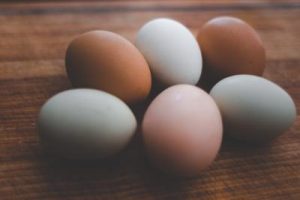
-
How much protein is there in an egg?
- One egg contains about 6.3 grams of protein by weight. This is about 13% of your daily need.
-
How many calories are there in a boiled egg?
- One large boiled egg (53 g) will have around 70-78 calories.
-
Is egg yolk good for skin?
- Yes. Egg yolk is an essential component in reaping the benefits of eggs. Egg yolk helps to prevent acne and pimples. This is because there are antibodies in egg yolk that counteract acne vulgaris (or acne).
-
Egg white for skin tightening – Is it effective?
- Yes and no. Egg white will help tighten your skin when they are applied to your face. But, once you wash it off, this effect start to wear off.
- So does egg white tighten skin? – Yes. But this is for the rough duration of their application.
- Is egg white good for skin tightening on a permanent basis? – Not really. However, regular application may help to give the perception of tight skin. On the same note, this can wear off once you stop doing it.
- Yes and no. Egg white will help tighten your skin when they are applied to your face. But, once you wash it off, this effect start to wear off.
-
Does egg white whiten your skin?
- To an extent, yes. Egg whites have properties that help in gently removing tan when applied to the face. In fact, egg white and honey mask is a common DIY treatment for getting fairer skin complexion. However, please keep in mind that this effect is very small and you may need to do this regularly and consistently to start seeing some results.
-
Egg white and lemon for skin whitening – Is it effective?
- To an extent, yes. This is because egg whites have properties that help in gently removing tan when applied to the face. Whereas, lemon has antibacterial and antiseptic properties. This helps to remove impurities from your face and keep it clean. In this way, they work in tandem to give the appearance of a whiter complexion for your skin.
-
Eggs for oily skin – does it help?
- Yes, eggs are good for oily skin. You can apply the egg white with lemon to get this effect. The effect will be visible once you wash the mask off. This is because egg white emulsifies the oil with water. Whereas, lemon has antibacterial and antiseptic properties like soap. And, in combination, they help to separate the oil from your face and wash it off.
-
What does egg white do to your skin?
- In a nutshell, egg white benefits you by preventing wrinkles, protecting from UV and pollution damage, removing dark circles around your eyes, preventing blackheads, preventing oily skin and tightening your skin.
-
Will eggs make your hair grow?
- Yes. Eggs have peptides and vitamins that help in hair growth. The a recently discovered benefit of eggs and opens up more research avenues.
Well… that’s it, folks. Hope you enjoyed the article of the benefits of eggs. You can learn more about health topics in our other articles.
References
- National Institutes of Health. https://ods.od.nih.gov/factsheets/list-all/. Accessed on 19-Jan-2020.
- Aranow C. (2011). Vitamin D and the immune system. Journal of investigative medicine: the official publication of the American Federation for Clinical Research, 59(6), 881–886. doi:10.2310/JIM.0b013e31821b8755. https://www.ncbi.nlm.nih.gov/pmc/articles/PMC3166406/
- López Sobaler AM, Aparicio Vizuete A, Ortega RM. Role of the egg in the diet of athletes and physically active people. Nutr Hosp. 2017 Oct 15;34(Suppl 4):31-35. doi: 10.20960/nh.1568. https://www.ncbi.nlm.nih.gov/pubmed/29156929
- Rebello C, Greenway FL, Dhurandhar NV. Functional foods to promote weight loss and satiety. Current Opinion in Clinical Nutrition and Metabolic Care. 17(6):596–604, Nov 2014. DOI: 10.1097/MCO.0000000000000110. PMID: 25159561. https://www.ncbi.nlm.nih.gov/pubmed/25159561
- Egg Nutrition & Calories. Egg Farmers of Alberta. https://eggs.ab.ca/eggs/egg-nutrition/. Accessed on 19-Jan-2020.
- James M. Greenblatt M.D., Psychological Consequences of Vitamin D Deficiency. Psychology Today. https://www.psychologytoday.com/us/blog/the-breakthrough-depression-solution/201111/psychological-consequences-vitamin-d-deficiency. Accessed on 19-Jan-2020.
- National Institutes of Health. https://ods.od.nih.gov/factsheets/VitaminB12-Consumer/. Accessed on 19-Jan-2020.
- Cannell JJ, Vieth R, Umhau JC, Holick MF, Grant WB, Madronich S, Garland CF, Giovannucci E.. (2006). Epidemic influenza and vitamin D. Epidemiology and infection, 134(6), 1129–1140. doi:10.1017/S0950268806007175. https://www.ncbi.nlm.nih.gov/pubmed/16959053/.
- Lutein & Zeaxanthin, American Optometric Association. https://www.aoa.org/patients-and-public/caring-for-your-vision/diet-and-nutrition/lutein. Accessed on 19-Jan-2020.
- Dussaillant C, Echeverría G, Rozowski J, Velasco N, Arteaga A, Rigotti A. Egg intake and cardiovascular disease: a scientific literature review. Nutr Hosp. 2017 Jun 5;34(3):710-718. doi: 10.20960/nh.473. https://www.ncbi.nlm.nih.gov/pubmed/28627211.
- Fujita, S., & Volpi, E. (2004). Nutrition and sarcopenia of ageing. Nutrition research reviews, 17(1), 69–76. doi:10.1079/NRR200481. https://www.ncbi.nlm.nih.gov/pmc/articles/PMC3183822/
- Abbaspour, N., Hurrell, R., & Kelishadi, R. (2014). Review on iron and its importance for human health. Journal of research in medical sciences : the official journal of Isfahan University of Medical Sciences, 19(2), 164–174. https://www.ncbi.nlm.nih.gov/pmc/articles/PMC3999603/
- National Institutes of Health. https://ods.od.nih.gov/factsheets/vitaminK-HealthProfessional/. Accessed on 19-Jan-2020.
- National Institutes of Health. https://ods.od.nih.gov/factsheets/VitaminA-HealthProfessional/. Accessed on 19-Jan-2020.
- Eggs vs. Egg Whites Which One Is Healthier?, Sauder’s Eggs. https://www.saudereggs.com/blog/eggs-vs-egg-whites-which-one-is-healthier/. Accessed on 19-Jan-2020.
- Müller H. Daily intake of carotenoids (carotenes and xanthophylls) from total diet and the carotenoid content of selected vegetables and fuit. Z Ernahrungswiss. 1996 Mar;35(1):45-50. https://www.ncbi.nlm.nih.gov/pubmed/8815648
- Jensen GS, Shah B, Holtz R, Patel A, Lo DC. Reduction of facial wrinkles by hydrolyzed water-soluble egg membrane associated with reduction of free radical stress and support of matrix production by dermal fibroblasts. Clin Cosmet Investig Dermatol. 2016 Oct 14;9:357-366.
- Candilish JK, Scougall RK. L-5-hydroxylysine as a constituent of the shell membrane of the hen’s egg. Int J Protein Res. 1969;1:299-306.
- Yoo J, Park K, Yoo Y, Kim J, Yang H, Shin Y. Effects of Egg Shell Membrane Hydrolysates on Anti-Inflammatory, Anti-Wrinkle, Anti-Microbial Activity and Moisture-Protection. Korean J Food Sci Anim Resour. 2014;34(1):26-32.
- Yoo JH, Kim JK, Yang HJ, Park KM. Effects of Egg Shell Membrane Hydrolysates on UVB-radiation-induced Wrinkle Formation in SKH-1 Hairless Mice. Korean J Food Sci Anim Resour. 2015;35(1):58-70.
- Guarderas F, Leavell Y, Sengupta T, Zhukova M, Megraw TL. Assessment of Chicken-Egg Membrane as a Dressing for Wound Healing. Adv Skin Wound Care. 2016 Mar;29(3):131-4.
- Vuong TT, Rønning SB, Suso HP, Schmidt R, Prydz K, Lundström M, Moen A, Pedersen ME. The extracellular matrix of eggshell displays anti-inflammatory activities through NF-κB in LPS-triggered human immune cells. J Inflamm Res. 2017 Jul 4;10:83-96.
- FINAL REPORT. Human Clinical Safety and Efficacy Pilot Study BiovaDerm: A Topical Egg ShellMembrane Ingredient for Aged or Sun Damaged Skin. Clinicians and study personnel at: Science, Toxicology & Technology—Product Research; July 7, 2009:23 pgs.
- Colombo, Victor E. et al., Treatment of brittle fingernails and onychoschizia with biotin: Scanning electron microscopy. Journal of the American Academy of Dermatology (1990), Volume 23, Issue 6, 1127 – 1132. https://www.ncbi.nlm.nih.gov/pubmed/2273113
- Selvan, K., Sentila, R., & Michael, A. (2012). Generation and characterization of chicken egg yolk antibodies against propionibacterium acnes for the prevention of acne vulgaris. Indian journal of dermatology, 57(1), 15–19. doi:10.4103/0019-5154.92669. https://www.ncbi.nlm.nih.gov/pmc/articles/PMC3312649/
- Fox, L., Csongradi, C., Aucamp, M., du Plessis, J., & Gerber, M. (2016). Treatment Modalities for Acne. Molecules (Basel, Switzerland), 21(8), 1063. doi:10.3390/molecules21081063. https://www.ncbi.nlm.nih.gov/pmc/articles/PMC6273829/
- Toshio Nakamura, Haruo Yamamura, Kyungho Park, Caroline Pereira, Yoshikazu Uchida, Noriko Horie, Mujo Kim, and Satoshi Itami.Journal of Medicinal Food.Jul 2018.701-708.http://doi.org/10.1089/jmf.2017.4101. https://www.ncbi.nlm.nih.gov/pubmed/29583066
- Goluch-Koniuszy Z. S. (2016). Nutrition of women with hair loss problem during the period of menopause. Przeglad menopauzalny = Menopause review, 15(1), 56–61. doi:10.5114/pm.2016.58776. https://www.ncbi.nlm.nih.gov/pmc/articles/PMC4828511/
- Mokhtari, Z., Poustchi, H., Eslamparast, T., & Hekmatdoost, A. (2017). Egg consumption and risk of non-alcoholic fatty liver disease. World journal of hepatology, 9(10), 503–509. doi:10.4254/wjh.v9.i10.503. https://www.ncbi.nlm.nih.gov/pmc/articles/PMC5387362/
- Are eggs risky for heart health? Harvard Health Publishing. https://www.health.harvard.edu/heart-health/are-eggs-risky-for-heart-health. Accessed on 19-Jan-2020.
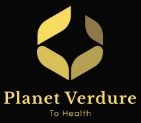
I hope that you won’t stop writing such interesting articles. I’m waiting for more of your content. I’m going to follow you!
We are a family run dive centre in Cyprus, we love your content!
This design is wicked! You obviously know how to keep a reader entertained. Between your wit and your videos, I was almost moved to start my own blog (well, almost…HaHa!) Wonderful job. I really loved what you had to say, and more than that, how you presented it. Too cool!
I love your blog.. very nice colors & theme. Did you create this website yourself or did you hire someone to do it for you? Plz respond as I’m looking to create my own blog and would like to know where u got this from. thanks
Aw, this was a really good post. Taking the time and actual effort to produce a very good article… but what can I say… I procrastinate a lot and don’t manage to get nearly anything done.|
Love watching Sun !
I抦 now not positive the place you’re getting your info, but good topic. I needs to spend a while studying much more or working out more. Thank you for magnificent info I used to be in search of this information for my mission.
Simply wish to say your article is as astounding. The clearness in your post is just nice and i can assume you are an expert on this subject. Well with your permission let me to grab your feed to keep up to date with forthcoming post. Thanks a million and please keep up the rewarding work.|
I got this web page from my pal who informed me concerning this web page and now this time I am browsing this web page and reading very informative articles or reviews here.|
Like!! I blog frequently and I really thank you for your content. The article has truly peaked my interest.
I agree with you
Hey there just wanted to give you a quick heads up. The text in your article seem to be running off the screen in Ie. I’m not sure if this is a format issue or something to do with internet browser compatibility but I thought I’d post to let you know. The layout look great though! Hope you get the issue resolved soon. Many thanks